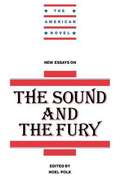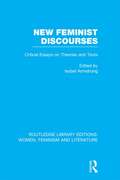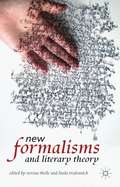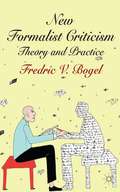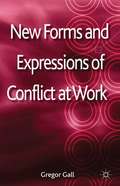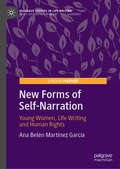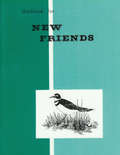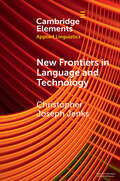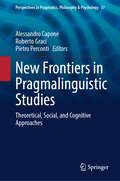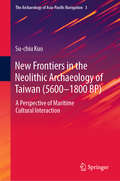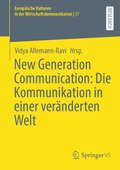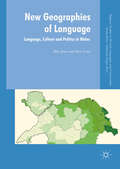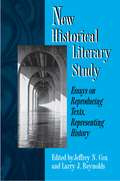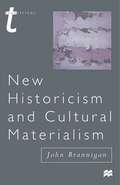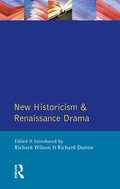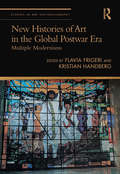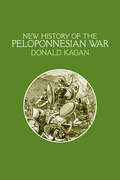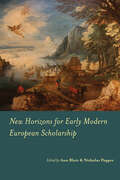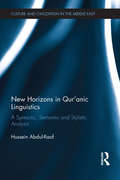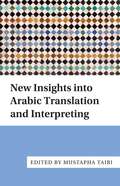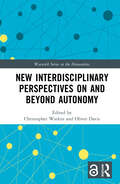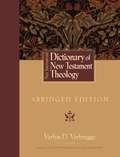- Table View
- List View
New Essays on the Sound and the Fury
by Noel PolkWilliam Faulkner's The Sound and the Fury met with only limited success when published in 1929, probably due to its fragmented, non-chronological structure. Since, however, it has become one of the most popular of Faulkner's novels serving as a litmus paper upon which critical approaches have tested themselves. In the introduction to this volume Noel Polk (the editor) traces the critical responses to the novel from the time of its publication to the present day. The essays that follow present contemporary reassessments of The Sound and the Fury from a variety of critical perspectives. Dawn Trouard offers us the women of The Sound and the Fury, reading against the grain of the predominant critical tradition which sees the women through the lens of masculine cultural biases. Donald M. Kartiganer comes to terms with the ways in which the novel simultaneously attracts readers and resists readings. Richard Godden discusses the relationship between incest and miscegenation. Noel Polk examines closely the way Faulkner experiments with language.
New Feminist Discourses: Critical Essays on Theories and Texts (Routledge Library Editions: Women, Feminism and Literature)
by Isobel ArmstrongThis collection of new feminist essays represents the work of young critics researching and teaching in British Universities. Aiming to set the agenda for feminist criticism in the nineties, the essays debate themes crucial to the development of feminist thought: among them, the problems of gendered knowledge and the implications of accounts of gendered language, cultural restraints on the representation of sexuality, women’s agency, cultural and political change, a feminist aesthetics and new readings of race and class. This variety is given coherence by a unity of aim – to forge new feminist discourses by addressing conceptual and cultural questions central to problems of gender and sexual difference. The topics of discussion range from matrilinear thought to seventeenth-century prophecy; the poetry of Amelia Lanyer to Julia Margaret Cameron’s photographs; from Dorothy Richardson and Virginia Woolf to eighteenth-century colonial painting of the South Pacific; from medieval romance to feminist epistemology. The essays utilise and question the disciplines of literary criticism, art history, photography, psychoanalysis, Marxist history and post-structuralist theory.
New Formalisms and Literary Theory
by Verena Theile Linda TredennickBringing together scholars who have critically followed New Formalism's journey through time, space, and learning environment, this collection of essays both solidifies and consolidates New Formalism as a burgeoning field of literary criticism and explicates its potential as a varied but viable methodology of contemporary critical theory.
New Formalist Criticism
by Fredric V. BogelNew Formalist Criticism defines and theorizes a mode of formalist criticism that is theoretically compatible with current thinking about literature and theory. New formalism anticipates a move in literary studies back towards the text and, in so doing, establishes itself as one of the most exciting areas of contemporary critical theory.
New Forms and Expressions of Conflict at Work
by Gregor GallA survey and analysis of the new forms and expressions of conflict at work under capitalism. This collection uses theoretical and empirical approaches to demonstrate that there is an underlying historical continuity to current and new forms and expressions of conflict at work and that there is also a path dependency by country and culture. Although the strike is in decline in many countries, it is not so in all and different means of expressing and resolving collective grievances are used but not always as substitutes to the weapon of strike.
New Forms of Self-Narration: Young Women, Life Writing and Human Rights (Palgrave Studies in Life Writing)
by Ana Belén Martínez GarcíaThis book is a timely study of young women’s life writing as a form of human rights activism. It focuses on six young women who suffered human rights violations when they were girls and have gone on to become activists through life writing: Malala Yousafzai, Hyeonseo Lee, Yeonmi Park, Bana Alabed, Nujeen Mustafa, and Nadia Murad. Their ongoing life-writing projects diverge to some extent, but all share several notable features: they claim a testimonial collective voice, they deploy rights discourse, they excite humanitarian emotions, they link up their context-bound plight with bigger social justice causes, and they use English as their vehicle of self-expression and self-construction. This strategic use of English is of vital importance, as it has brought them together as icons in the public sphere within the last six years. New Forms of Self-Narration is the first ever attempt to explore all these activists’ life-writing texts side by side, encompassing both the written and the audiovisual material, online and offline, and taking all texts as belonging to a unique, single, though multifaceted, project.
New Friends Workbook (Grade #3)
by Pathway PublishersThis workbook has been prepared especially for third graders in Amish Parochial schools, to accompany the grade three reader, New Friends. The exercises were designed to train the children to work independently, with a minimum of teacher assistance. The teacher will find tests in the back of this workbook.
New Frontiers in Language and Technology (Elements in Applied Linguistics)
by Christopher Joseph JenksThe Fourth Industrial Revolution (4IR) describes the technological transformations that are incrementally, but radically, changing everyday life practices. Like previous industrial revolutions, technological advancements are so pervasive and impactful that everything from an individual's sense of identity and understanding of the world to the economic success of an entire industry are profoundly altered by 4IR innovation. Despite the significance of 4IR transformations, little applied linguistic research has examined how these emergent technologies collectively transform human behavior and communication. To this end, this Element identifies key 4IR issues and outlines how they relate to applied linguistic research. The Element argues that applied linguists are in an excellent position to contribute to such research, as expertise in language and communication is critical to understanding 4IR issues. However, to make interdisciplinary and wider societal contributions, applied linguists must rethink how 4IR technologies can be harnessed to more efficiently publish and disseminate timely research.
New Frontiers in Pragmalinguistic Studies: Theoretical, Social, and Cognitive Approaches (Perspectives in Pragmatics, Philosophy & Psychology #37)
by Alessandro Capone Pietro Perconti Roberto GraciThis book contains a comprehensive view of pragmalinguistic studies and their recent ramifications, boasting some of the most advanced recent research in pragmatics. Organised into three sections—pragmalinguistics, social pragmatics, and cognitive-inferential pragmatics, respectively—the chapters enable an understanding of the possible applications of linguistic and philosophical theories in practical fields. Covering topics such as polysemy across languages and lexical externalism, the role of literal meaning in the construction of metaphorical meaning, the pragmatics of truth, the roles of reflexivity in meaning negotiation, argumentation and discourse, the pragmatics of taboo, linguistic and cognitive aspects of formation of implicates, and reflections on neuropragmatics and clinical pragmatics in Autism Spectrum Disorder and Schizophrenia—to name but a few exciting areas of exploration—this book is of interest to scholars and postgraduate students in the fields of semantics, pragmatics and philosophy of language, cognitive science, and other areas of linguistics.
New Frontiers in the Neolithic Archaeology of Taiwan: A Perspective of Maritime Cultural Interaction (The Archaeology of Asia-Pacific Navigation #3)
by Su-chiu KuoThis book summarizes the systematic research on the Neolithic cultures of Taiwan, based on the latest archaeological discoveries, and focusing on the maritime interactions between mainland southeast China, Taiwan, and southeast Asia during (5600-1800 BP). The study demonstrates and sheds light on the distinctiveness of Taiwan’s Neolithic cultures, their interactions with the external cultures of its surrounding regions, the maritime cultural diffusion and early seafaring across sea regions like the Taiwan Strait, Bashi channel and South China Sea. Drawing on the author’s deep understanding of Taiwan and its surrounding regions, the book also incorporates recent archeological findings by Taiwanese researchers. Further, based on a new reconstruction of the spatiotemporal framework of Taiwanese prehistoric cultures, the chronologically arranged chapters discuss Neolithic cultures of the early, middle, late and final stage of this island region, revealing the prehistoric cultural development, regional typology and their maritime interactions with surrounding regions. The typological study of the native traits and external cultural influences of each stage of Neolithic culture shows the prehistoric and early history of this key stepping stone in the Asia-Pacific region.
New Generation Communication: Die Kommunikation in einer veränderten Welt (Europäische Kulturen in der Wirtschaftskommunikation #37)
by Vidya Allemann-RaviCommunication of the new generation is upon us. It was not long ago that the idea of remote working or of machine learning seemed like futuristic endeavors. Yet now, the prospect of using various communication technologies to work for us has never been more feasible. We are navigating connected ecosystems and using data technologies and algorithms to keep pace with an ever-shifting business world. This volume focuses on the impact of communication in a changing world on society and business cultures. The issues that are raised by the authors of this volume range from exploring how language and technology interact in the workplace environment to considering the use of generative technologies and artificial intelligence in marketing and advertising. While the authors showcase a diversity of disciplinary and methodological approaches, they are united in their underlying belief that communication in a changing world is, by and large, a facilitator of dialogue, and is powered by interactions and expansive, cross-disciplinary conversations.
New Geographies of Language: Language, Culture and Politics in Wales (Palgrave Studies in Minority Languages and Communities)
by Rhys Jones Huw LewisThis book develops a novel approach to the study of language, bringing it into dialogue with the latest geographical concepts and concerns and provides a comprehensive account of the geography of Welsh language analysing policy development, language use, ability and shift. The authors examine in particular: the different ways in which languages can be mapped; how geographical insights can be used to develop understandings of language use; the value of assemblage theory as a way of interpreting the social, technical and spatial aspects of language policy development; and the geographies that characterise institutional engagements with languages. This book will set a research agenda for the geographical study of language, developing a conceptual framework that will offer fresh insights to researchers in the fields of Applied Linguistics, Sociolinguistics, Minority Languages, Geolinguistics, and Public Policy.
New Heroes in Antiquity: From Achilles to Antinoos (Revealing Antiquity #18)
by Christopher P. JonesHeroes and heroines in antiquity inhabited a space somewhere between gods and humans. In this detailed, yet brilliantly wide-ranging analysis, Christopher Jones starts from literary heroes such as Achilles and moves to the historical record of those exceptional men and women who were worshiped after death. He asks why and how mortals were heroized, and what exactly becoming a hero entailed in terms of religious action and belief. He proves that the growing popularity of heroizing the dead—fallen warriors, family members, magnanimous citizens—represents not a decline from earlier practice but an adaptation to new contexts and modes of thought. The most famous example of this process is Hadrian’s beloved, Antinoos, who can now be located within an ancient tradition of heroizing extraordinary youths who died prematurely. This book, wholly new and beautifully written, rescues the hero from literary metaphor and vividly restores heroism to the reality of ancient life.
New Historical Literary Study: Essays on Reproducing Texts, Representing History
by Jeffrey N. Cox & Larry J. ReynoldsThis volume, growing out of the celebrated turn toward history in literary criticism, showcases some of the best new historical work being done today in textual theory, literary history, and cultural criticism. The collection brings together for the first time key representativesfrom various schools of historicist scholarship, including leading critics whose work has helped define new historicism. The essays illuminate literary periods ranging from Anglo-Saxon to postmodern, a variety of literary texts that includes The Siege of Thebes, Macbeth, The Jazz Singer, and The Chosen Place, the Timeless People, and central issues that have marked new historicism: power, ideology, textuality, othering, marginality, exile, and liberation. The contributors are Janet Aikins, Lawrence Buell, Ralph Cohen, Margaret Ezell, Stephen Greenblatt, Terence Hoagwood, Jerome McGann, Robert Newman, Katherine O'Keeffe, Lee Patterson, Michael Rogin, Edward Said, and Hortense Spillers. The editors' introduction situates the various essays within contemporary criticism and explores the multiple, contestatory issues at stake within the historicist enterprise.
New Historicism and Cultural Materialism
by John BranniganNew historicism and cultural materialism emerged in the early 1980s as prominent literary theories and came to represent a revival of interest in history and in historicising literature. Their proponents rejected both formalist criticism and earlier attempts to read literature in its historical context and defined new ways of thinking about literature in relation to history. This study explains the development of these theories and demonstrates both their uses and weaknesses as critical practices. The potential future direction for the theories is explored and the controversial debates about their validity in literary studies are discussed.
New Historicism and Renaissance Drama (Longman Critical Readers)
by Richard Wilson Richard DuttonNew Historicism has been one of the major developments in literary theory over the last decade, both in the USA and Europe. In this book, Wilson and Dutton examine the theories behind New Historicism and its celebrated impact in practice on Renaissance Drama, providing an important collection both for students of the genre and of literary theory.
New Histories of Art in the Global Postwar Era: Multiple Modernisms (ISSN)
by Flavia FrigeriThis book maps key moments in the history of postwar art from a global perspective. The reader is introduced to a new globally oriented approach to art, artists, museums and movements of the postwar era (1945–70). Specifically, this book bridges the gap between historical artistic centers, such as Paris and New York, and peripheral loci. Through case studies, previously unknown networks, circulations, divides and controversies are brought to light. From the development of Ethiopian modernism, to the showcase of Brazilian modernity, this book provides readers with a new set of coordinates and a reassessment of well-trodden art historical narratives around modernism. This book will be of interest to scholars in art historiography, art history, exhibition and curatorial studies, modern art and globalization.
New Histories of Art in the Global Postwar Era: Multiple Modernisms (Studies in Art Historiography)
by Flavia FrigeriThis book maps key moments in the history of postwar art from a global perspective. The reader is introduced to a new globally oriented approach to art, artists, museums and movements of the postwar era (1945–70). Specifically, this book bridges the gap between historical artistic centers, such as Paris and New York, and peripheral loci. Through case studies, previously unknown networks, circulations, divides and controversies are brought to light. From the development of Ethiopian modernism, to the showcase of Brazilian modernity, this book provides readers with a new set of coordinates and a reassessment of well-trodden art historical narratives around modernism. This book will be of interest to scholars in art historiography, art history, exhibition and curatorial studies, modern art and globalization.
New History of the Peloponnesian War
by Donald KaganA New History of the Peloponnesian War is an ebook-only omnibus edition that includes all four volumes of Donald Kagan's acclaimed account of the war between Athens and Sparta (431–404 B.C.): The Outbreak of the Peloponnesian War, The Archidamian War, The Peace of Nicias and the Sicilian Expedition, and The Fall of the Athenian Empire. Reviewing the four-volume set in The New Yorker, George Steiner wrote, "The temptation to acclaim Kagan's four volumes as the foremost work of history produced in North America in the twentieth century is vivid. . . . Here is an achievement that not only honors the criteria of dispassion and of unstinting scruple which mark the best of modern historicism but honors its readers." All four volumes are also sold separately as both print books and ebooks.
New Horizons for Early Modern European Scholarship
by Ann Blair and Nicholas PopperAn illuminating exploration of the new frontiers—and unsettled geographical, temporal, and thematic borders—of early modern European history.The study of early modern Europe has long been the source of some of the most creative and influential movements in historical scholarship. New Horizons for Early Modern European Scholarship explores recent developments in historiography both to exhibit the field's continuing vibrancy and to highlight emerging challenges to long-assumed truths. Essays examine • how key ideas and intellectual practices arose, circulated through scholarly culture, and gave way to subsequent forms • Europe's transforming relationship with Asia, the Americas, Africa, and the rest of the world• how overlooked evidence illuminates vital but obscured people, practices, and objects • connections between disciplines, types of sources, time periods, and placesOpening up emerging possibilities, this book demonstrates that early modern European scholarship remains a source for groundbreaking historical insights and methodologies that would benefit the study of any time and place. Contributors: Alexander Bevilacqua, Ann Blair, Daniela Bleichmar, William J. Bulman, Frederic Clark, Anthony Grafton, Jill Kraye, Yuen-Gen Liang, Elizabeth McCahill, Nicholas Popper, Amanda Wunder
New Horizons in Qur'anic Linguistics: A Syntactic, Semantic and Stylistic Analysis (Culture and Civilization in the Middle East)
by Hussein Abdul-RaofNew Horizons in Qur'anic Linguistics provides a panoramic insight into the Qur'anic landscape fenced by innate syntactic, semantic and stylistic landmarks where context and meaning have closed ranks to impact morphological form in order to achieve variegated illocutionary forces. It provides a comprehensive account of the recurrent syntactic, stylistic, morphological, lexical, cultural, and phonological voids that are an iceberg looming in the horizon of Qur'anic genre. It is an invaluable resource for contrastive linguistics, translation studies, and corpus linguistics. Among the linguistic topics are: syntactic structures, ellipsis, synonymy, polysemy, semantic redundancy, incongruity, and contrastiveness, selection restriction rule, componential features, collocation, cyclical modification, foregrounding, backgrounding, pragmatic functions and categories of shift, pragmatic distinction between verbal and nominal sentences, morpho-semantic features of lexical items, context-sensitive word and phrase order, vowel points and phonetic variation. The value of European theoretical linguistics to the analysis of the Qur’anic text at a macro level has been overlooked in the academic literature to date and this book addresses this research gap, providing a key resource for students and scholars of linguistics and specifically working in Arabic or Qur’anic Studies.
New Insights into Arabic Translation and Interpreting
by Mustapha TaibiThis book addresses translation and interpreting with Arabic either as a source or target language. It focuses on new fields of study and professional practice, such as community translation and interpreting, and offers fresh insights into the relationship between culture, translation and interpreting. Chapters discuss issues relating specifically to Arabic and the Arab cultural context and contribute views, research findings and applications that come from a language combination and a cultural background quite different from traditional Eurocentric theoretical and professional positions. This volume is a significant addition to resources on Arabic translation and interpreting and contributes fresh perspectives to translation studies in general. It is of interest to students, researchers and professionals working in public service, community, legal, administrative and healthcare translation and interpreting, as well as intercultural communication and translator education.
New Interdisciplinary Perspectives On and Beyond Autonomy (Warwick Series in the Humanities)
by Oliver Davis Christopher WatkinWhat does ‘autonomy’ mean today? Is the Enlightenment understanding of autonomy still relevant for contemporary challenges? How have the limits and possibilities of autonomy been transformed by recent developments in artificial intelligence and big data, political pressures, intersecting oppressions and the climate emergency? The challenges to autonomy today reach across society with unprecedented complexity, and in this book leading scholars from philosophy, economics, linguistics, literature and politics examine the role of autonomy in key areas of contemporary life, forcefully defending a range of different views about the nature and extent of resistance to autonomy today. These essays are essential reading for anyone who wants to understand the predicament and prospects of one of modernity’s foundational concepts and one of our most widely cherished values. Chapter 5.6 and 9 of this book is freely available as a downloadable Open Access PDF at http://www.taylorfrancis.com under a Creative Commons [Attribution-Non Commercial-No Derivatives (CC-BY-NC-ND)] 4.0 license.
New International Dictionary of New Testament Theology: Abridged Edition
by Verlyn VerbruggeThis abridgment of Colin Brown’s original four volume work is arranged with its entries in Greek alphabet order, which makes it easy to find the discussion of a particular word. All Greek words are transliterated into English and linked with their Goodrick/Kohlenberger numbers. This book was formerly titled The NIV Theological Dictionary of New Testament Words. Now it has been reset in double columns and wider margins.

